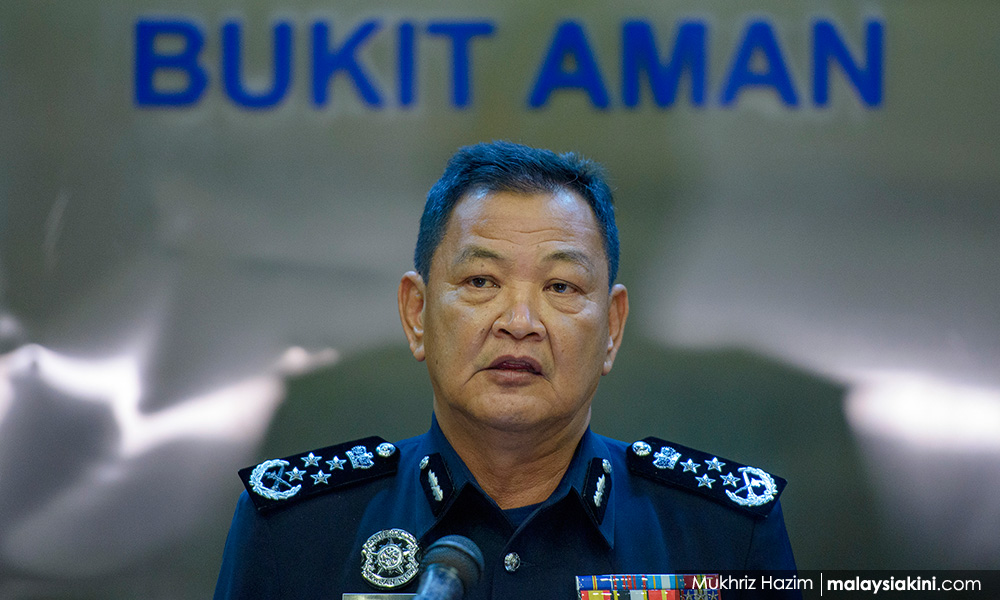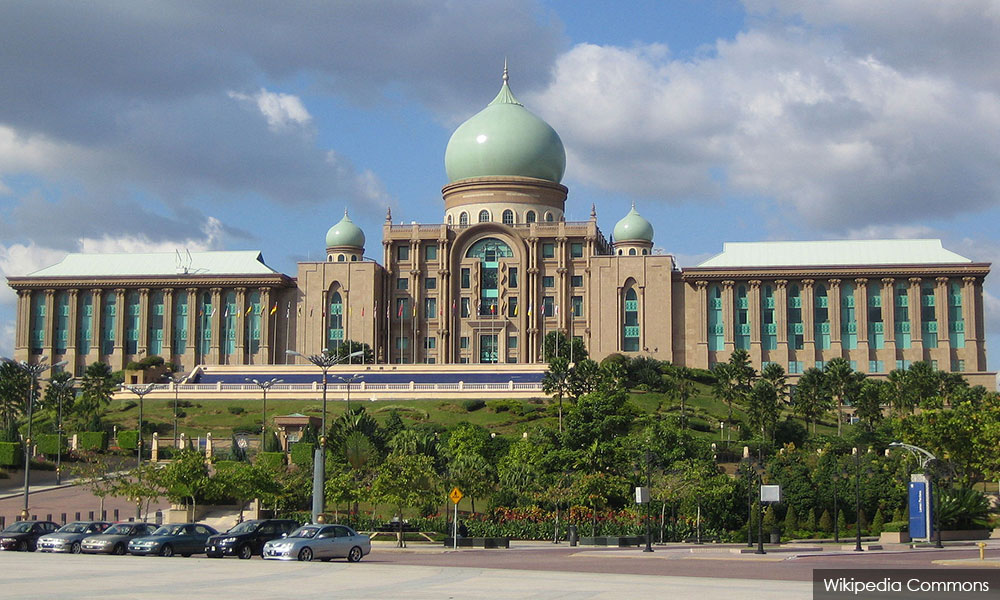“The problem is that in most cases the agencies they go to in order to tell them about wrongdoing inside or outside the department respond along the lines of: "If we did this (the prosecuted police officers), we would undermine the stability of society". Or they say, “We can’t afford a scandal. It would undermine public confidence in our police.” But what we’re seeing now is that it already has been undermined”.
– Frank Serpico
Inspector-General of Police Abdul Hamid Bador (above), in one of his press conferences, said that he does not take any public criticism of him personally. That is good because as the top cop in the country, his attempts to downplay and handle "in house" the kind of corruption and malfeasance he is talking about is exactly the kind of "blue code of silence" he rails against.
It is not for the IGP of this country to “handle” a group of rogue cops out to topple him and in the process engage in possibly criminal behaviour. The fact that de facto law minister Takiyuddin Hassan publicly stated that these allegations should be handled “in house” is also the kind of political interference that the IGP has railed against before - but now seems to think is an acceptable outcome for rogue police officers whom he claims he wants off the force.
The IGP has a record of being tough on corrupt officers and this would be the ideal opportunity (since he knows their identities and their illicit activities) to reject that blue wall of silence.
Hamid says he knows who those “cartel” members are who are out to topple him. Do you think these "young" police officers do not have the backing of political power groups? How do they get away with their activities if not with the collusion of state or federal level power brokers?
Hamid has in past pressers made allegations of former senior officers, including former police chiefs, engaged in acts that destabilise the integrity of the police force. All this is a matter of public record. The public has a right to know what exactly is going on and the measures being taken to correct the systemic dysfunction in the state security apparatus. Unfortunately, the public knows, nothing will ever come of these allegations. We have a history of not doing anything and for handling things "in house".
Who could forget the duelling IGPs fiasco in 2012? Here we had two senior members of the PDRM exposing the sordid relationship between the criminal class and the state security apparatus and I am sure the reason why it got to this state was because all those issues were handled “in house”.

Instead of addressing the issues and reforming the state security apparatus, what we had was a political class more interested in hiding behind the blue wall of silence. Why is that?
Corruption in the state security apparatus has always been systemic. In 2015, for example, a Special Branch report concluded that eighty percent of border security personnel were on the take. The police force has become a culture of its own succoured by religion, racialism and handouts, riddled with corruption and sharing a symbiotic relationship with the criminal underclass of Malaysian society and beholden to political masters who have always been engaged in protracted internal power struggles.
Admitting the problem
The current IGP earned a lot of press attention when he warned his lads not to be involved with gambling syndicates. Hamid correctly points out the nexus between the state security apparatus and gambling syndicates. What he leaves out is the political connection. This does not mean the state security apparatus should not crack down on corrupt politicians, but the first step is admitting that the state security apparatus has a problem.
Police corruption is not something that exists in a vacuum. It is an eco-system of political, criminal and commercial enterprises which sustain a black economy that (unfortunately) contributes to the development of the country.
Hamid has been candid about the repercussions by the Najib Abdul Razak regime of his attempts to investigate the 1MDB and SRC scandals, going so far as to acknowledge his role in thwarting a key witness in the SRC trial against Najib and Nik Faisal Ariff Kamil's attempt to escape with the aid of kuasa-kuasa tertentu.
I am sure there are good cops in Polis Di-Raja Malaysia (PDRM). The irony, of course, is that those good cops may also be part of the system of low-level corruption, but they carry out their duties in a way which are beneficial to whichever social strata they engage with. The system is complicated and it would be simplistic to ignore such realities.
However, I would argue that reforming the PDRM is more a political problem than an institutional one. While social activists, former law enforcement officers and various pressure groups are clamouring for reform, the people most often standing in their way are not from the PDRM – who do want reform for various reasons – but political operatives who stand to benefit from alliances with power groups within the PDRM.

DAP secretary-general Lim Guan Eng, in calling for a royal commission of inquiry (RCI) on this issue, said, "Malaysians want an open public inquiry, not an internal probe where the public fear will lead nowhere” - which is axiomatic, but the reality is that there have already been press reports, exposes and leakages from the state security apparatus, statements from high ranking senior officers, RCIs on corruption within the state security apparatus (Wang Kelian for instance).
And yet the political component (which briefly included Pakatan Harapan) failed to take action and reassure the public that even if the state security apparatus was not holding their own accountable, the political class were acting as a check and balance.
The reality is that nothing will come of this latest exposé by the top cop of the country. The political class has determined that the police will police their own and the senior cop making these allegations agrees with this sentiment. What this basically means for the “cartel” members is that the state has given its blessing to the top cop of the land to handle the matter as he sees fit and to "control" the cartel by any means necessary.
Expect a protracted war on social media, the political chessboard and across police districts as various proxies wage battles attempting to control or retain the fiefdoms that make up the state security apparatus. - Mkini
S THAYAPARAN is Commander (Rtd) of the Royal Malaysian Navy. A retired barrister-at-law, he hopes young people will assume the mantle of leadership if there is to be any hope for this country.
The views expressed here are those of the author/contributor and do not necessarily represent the views of MMKtT.




No comments:
Post a Comment
Note: Only a member of this blog may post a comment.